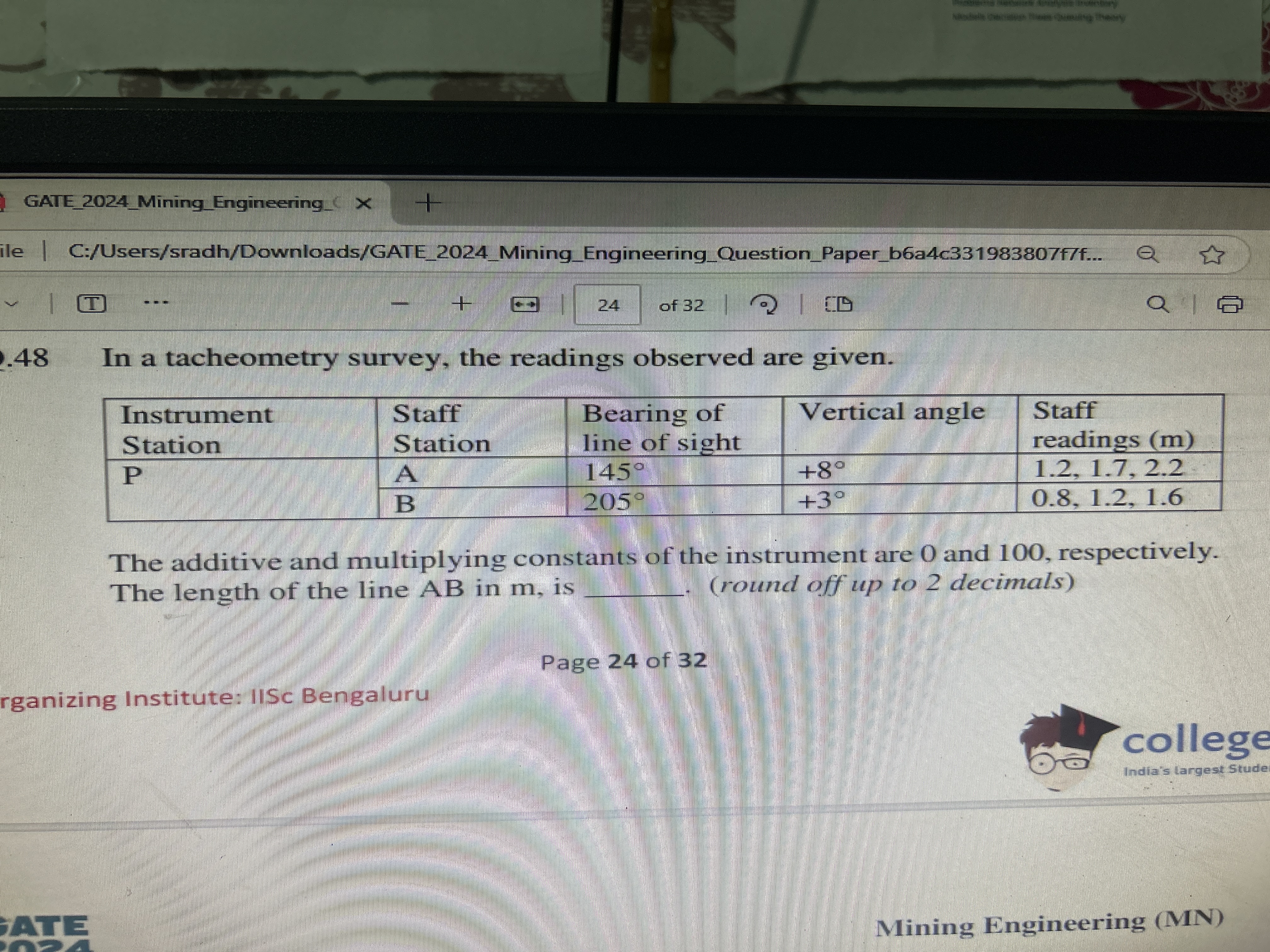In a tacheometry survey, the readings observed are given. The additive and multiplying constants of the instrument are 0 and 100, respectively. The length of the line AB in m is __... In a tacheometry survey, the readings observed are given. The additive and multiplying constants of the instrument are 0 and 100, respectively. The length of the line AB in m is _______ (round off up to 2 decimals).

Understand the Problem
The question involves calculating the length of line AB in a tacheometry survey using the given readings and angles. The approach includes applying tacheometric formulas to determine distances from the provided data.
Answer
$198.68 \text{ m}$
Answer for screen readers
$198.68 \text{ m}$
Steps to Solve
- Calculate Horizontal Distances for Both Stations
For station A, the formula to calculate the horizontal distance ($D_A$) is:
$$ D_A = (S_A - C) \times K $$
Where:
- $S_A$ is the staff reading at A (1.2 m)
- $C$ is the additive constant (0)
- $K$ is the multiplying constant (100)
Thus,
$$ D_A = (1.2 - 0) \times 100 = 120 \text{ m} $$
For station B, using the staff readings (0.8 m), the formula becomes:
$$ D_B = (S_B - C) \times K $$
Where:
- $S_B$ is the staff reading at B (0.8 m)
Thus,
$$ D_B = (0.8 - 0) \times 100 = 80 \text{ m} $$
- Adjust for Vertical Angles
Now we need to calculate the lengths that account for the vertical angles.
For station A with a vertical angle of $+8^\circ$, the distance can be adjusted as:
$$ L_A = D_A \cos(\theta_A) $$
Where $\theta_A = 8^\circ$.
Thus,
$$ L_A = 120 \cos(8^\circ) $$
For station B with a vertical angle of $+3^\circ$, the length is:
$$ L_B = D_B \cos(\theta_B) $$
Where $\theta_B = 3^\circ$.
Thus,
$$ L_B = 80 \cos(3^\circ) $$
- Calculate the Total Length of AB
Now using the formula for the length of the line AB ($L_{AB}$):
$$ L_{AB} = L_A + L_B $$
Substituting the values:
$$ L_{AB} = L_A + L_B = 120 \cos(8^\circ) + 80 \cos(3^\circ) $$
- Perform the Necessary Calculations
Now calculate $L_A$ and $L_B$:
$$ L_A = 120 \times 0.9903 \approx 118.84 \text{ m} $$
$$ L_B = 80 \times 0.9980 \approx 79.84 \text{ m} $$
Then,
$$ L_{AB} = 118.84 + 79.84 = 198.68 \text{ m} $$
- Round to Two Decimal Places
The final length of line AB, rounded to two decimal places, is:
$$ L_{AB} \approx 198.68 \text{ m} $$
$198.68 \text{ m}$
More Information
This problem involves using trigonometric principles in conjunction with tacheometric formulas to determine the length of a part of land surveyed. The calculations showcase how staff readings and vertical angles contribute to the overall distance measurement.
Tips
- Confusing staff readings with their adjustments; ensure to apply the correct formula.
- Not converting angles appropriately into radians if required; ensure angles are in the right format before using trigonometric functions.
- Forgetting to adjust distances based on vertical angles; always apply the cosine function for angle adjustments.
AI-generated content may contain errors. Please verify critical information